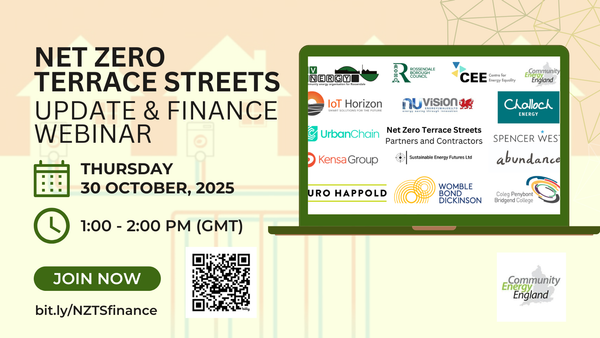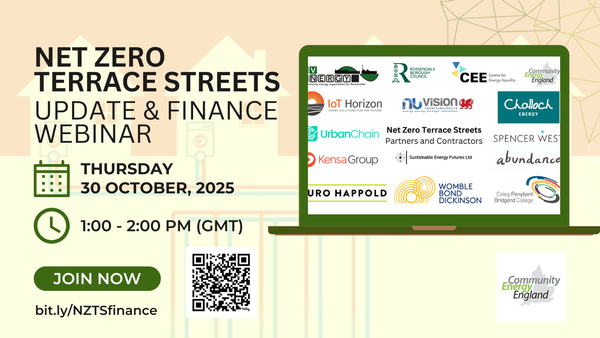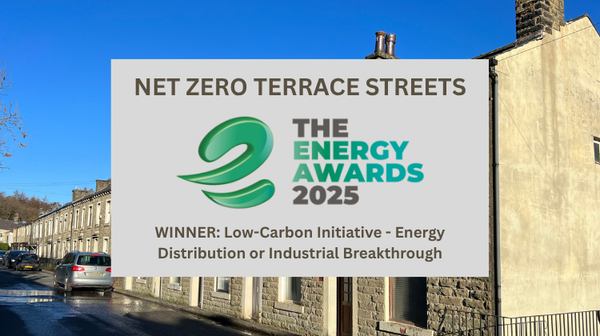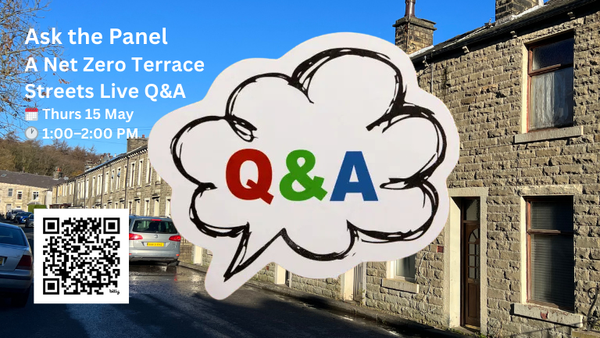Net Zero Terrace Streets Responds to ESNZ Inquiry
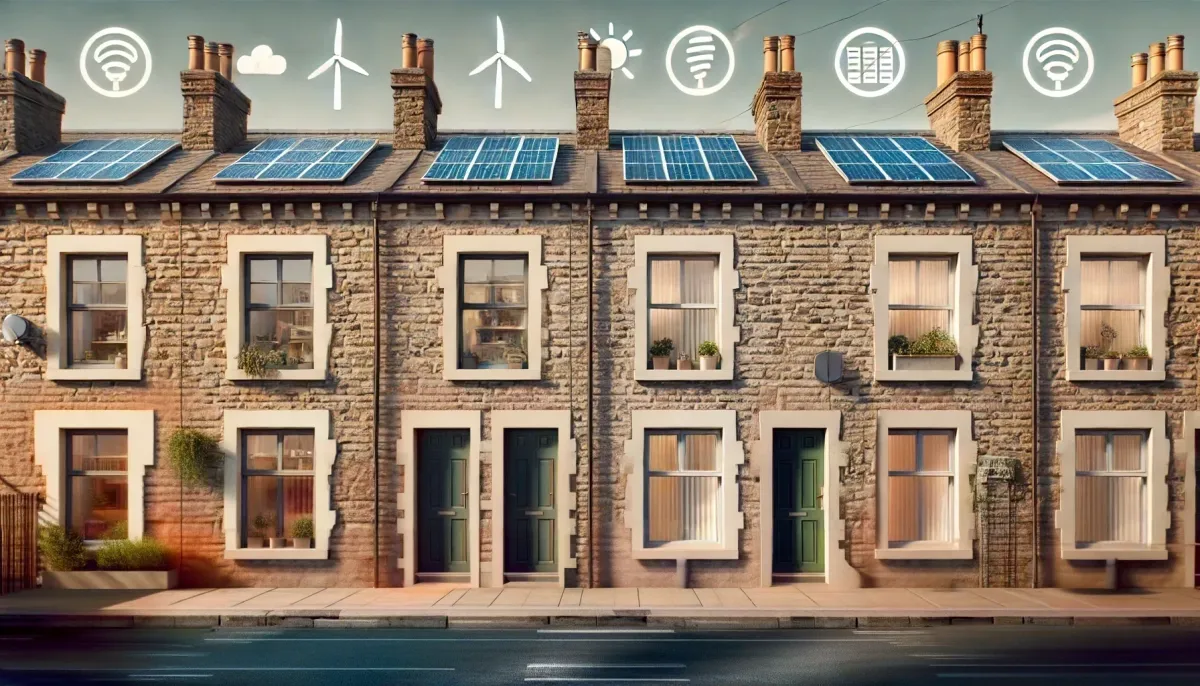
The Net Zero Terrace Streets team has submitted evidence to the the Energy Security and Net Zero (ESNZ) Select Committee in response to their call for submissions on “Retrofitting our homes for a net zero future,” ahead of a one-off session scheduled for 4 December.
Kate Gilmartin, Chair Rossendale Valley Energy, provided a brief overview of the team's methodology for the Committee’s consideration. Speaking after the submission, Kate said:
“It would be great to be able to inform the committee about a scalable, replicable solution and what support is needed for this to be enabled and reach those that need affordable energy and healthy warm homes, first and fastest. We’ll be happy to give evidence and details of an ‘on the ground’ project unpicking all the complexities of what delivery needs to look like.”
The NZTS submission in full:
The Net Zero Terrace Streets methodology for delivering healthy warm homes at scale
Overview
Rossendale Valley Energy is a volunteer lead, Community Benefit Society leading on a multi partnered initiative, Net Zero Terrace Streets (which has been short listed for a Utility week award). The initiative aims to address energy affordability and decarbonization for older terraced homes in the UK, particularly in places like Rossendale, Lancashire. This region has higher-than-average heating costs and significant fuel poverty, with older, inefficient housing stock that poses unique challenges for heat decarbonisation and energy efficiency. The project adopts a community-based approach to decarbonize and upgrade these homes, improving both energy efficiency and affordability.
The Problem
There are 6 million two- to three-bedroom terraced homes in the UK that are difficult to retrofit due to their age, lack of external space for ASHPs and affordability issues. The pressing energy concerns in these areas include:
- Higher Heating Costs and Fuel Poverty: Terraced homes in places like Rossendale see heating costs that are 18% higher than average, with fuel poverty rates at 15.3% compared to the national average of 13.4%.
- Outdated Housing Stock: Many homes have some of the lowest Energy Performance Certificates (EPCs) in the country, with a significant number privately rented, increasing the risk of fuel poverty among tenants.
- Lack of Infrastructure for Modern Solutions: Existing local energy plans do not cater to the specific needs of terraced homes, and programs like the Boiler Upgrade Scheme (BUS) are inappropriate as neither ASHP or individual GSHPs are suitable. The Home Upgrade Grant (HUG) has low uptake due to the complexity of both the grant funding and measures to be implemented.
- Broader Implications: Energy affordability directly impacts health and housing, creating a need for a coordinated, scalable approach that addresses both energy costs and the health impacts of poor quality homes.
The Solution
Rossendale Valley Energy is pioneering a standardised, modular, whole-system replicable approach to retrofit homes, offering an integrated solution that includes:
- Fabric Retrofit: Improving insulation and undertaking repairs to reduce energy loss.
- Shared Ground Loop Boreholes and Heat Pumps: Implementing shared loop infrastructure that allows terraced houses to benefit from efficient ground-source heat pumps (GSHP), coupled with smart water tanks, solar and batteries.
- Smart Energy Systems: Utilizing renewable energy sources and enabling demand-side flexibility to optimise and balance across the aggregation of homes bringing reduced costs.
- Local Energy Clubs: Establishing community energy clubs that develop local renewable energy projects and reinvest any surplus back into the community, addressing the “spark gap” (the gap between the cost of heating with gas and electricity).
- Community-Based, Non-Profit Model: Ensuring no upfront costs for residents, with costs recouped through a standing charge repayment model. This model emphasizes deep community engagement and stable, affordable annual bills, providing insulation from global energy price volatility.
Key Objectives
The primary goals of Rossendale Valley Energy’s approach are to:
- Achieve Affordable Energy and healthy warm homes: By providing stable, reduced energy costs, the project aims to lift residents out of fuel poverty and provide them with warm, healthy homes.
- Develop a Scalable, Investable Business Model: This approach seeks to shift from grant dependency by creating a viable business case for investors. Creating demand, through the no upfront cost model to enable economies of scale. Creating a new asset class of infrastructure and encouraging private sector participation.
- Create Jobs and Build Supply Chain Confidence: Investing in local jobs and training through collaboration with the supply chain and colleges will stabilize the workforce and avoid the boom-bust cycles typically associated with grant-dependent programs.
- Influence Government Policy: By engaging policymakers, RVE aims to build a model for policy frameworks that can accommodate mixed-tenure, non-ASHP solution housing and leverage tailored support mechanisms for low-income households
Next Steps and Support Needed
Rossendale Valley Energy is currently piloting a three-house demonstrator to develop the technical and financial model for a wider rollout, with aspirations to expand to a 200-home pilot. To achieve these goals, Rossendale Valley Energy seeks:
- Pilot Funding: To implement a full-scale, real-world test of the 200-home pilot, with emphasis on social impact, air quality improvements, and the multiplier of economic benefits.
- Policy Engagement: Working with National Government and local authorities to address barriers to scaling and grant/ tapered subsidy options to bring the solution to market.
- Continued Funding for Project Continuity: Essential for developing a replicable model, expanding partnerships, and building a workforce with the skills necessary to execute large-scale retrofitting. We are currently working on the DESNZ Net Zero Living funded programme, which ends in November 2025, we need commitment that we won’t face a funding hard stop whereby our team, knowledge and work to date is at risk of dissipating.
Conclusion
Rossendale Valley Energy’s Net Zero Terrace Streets project represents an innovative and necessary shift towards sustainable, affordable energy solutions that prioritize the well-being of local communities in areas where fuel poverty is highest. By adopting a community-centric model that integrates energy efficiency with socio-economic benefits, the initiative aims to ensure that the energy transition is both accessible and meaningful to residents. This localized, holistic approach not only contributes to national decarbonization goals but also addresses energy poverty and health inequalities in some of the UK’s most deprived areas. If successful, this model could be scaled and adapted nationwide, providing a blueprint for addressing energy challenges in the UK and beyond.

